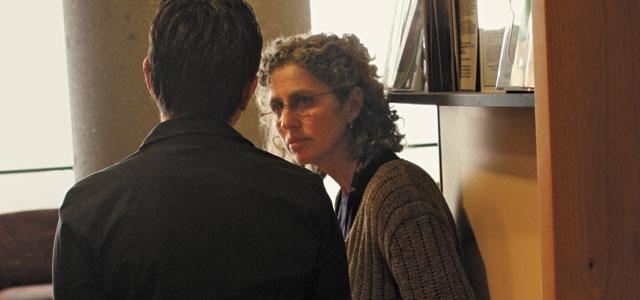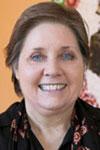
Erica Monasterio, MN, RN, FNP (photos by Elisabeth Fall)
Erica Monasterio and the Family Acceptance Project
About 10 years ago, Caitlin Ryan – a nationally recognized leader in lesbian, gay, bisexual and transgender (LGBT) health – began to consider her life’s work from an important, new angle.
 Caitlin Ryan “Even though advances have been made in our understanding of sexual orientation and gender identity, there had never been a comprehensive study of how families with LGBT adolescents adapt,” she says. “I’m a clinical social worker and, like nurses, we tend to focus on systems, including family. I wanted to truly understand how families and caregivers express acceptance and rejection of their LGBT children and how those behaviors affect their children’s mental and physical health.”
Caitlin Ryan “Even though advances have been made in our understanding of sexual orientation and gender identity, there had never been a comprehensive study of how families with LGBT adolescents adapt,” she says. “I’m a clinical social worker and, like nurses, we tend to focus on systems, including family. I wanted to truly understand how families and caregivers express acceptance and rejection of their LGBT children and how those behaviors affect their children’s mental and physical health.”
These questions would form the heart of the Family Acceptance Project, “a community research, intervention and education initiative” that Ryan directs from the Marian Wright Edelman Institute at San Francisco State University. The project began in 2002, when a grant from the California Endowment enabled Ryan and her colleagues – including UCSF’s Erica Monasterio, a longtime collaborator and original member of the project’s board – to conduct extensive research into family dynamics and LGBT youths.
Across many different cultures and settings, the work has rigorously documented behaviors that indicate acceptance and rejection of LGBT young people, as well as the effects such behaviors have on their mental and physical health. Using widely accepted research methods, the work has established that families’ rejecting behaviors of their LGBT children are associated with negative outcomes that include HIV, suicide, depression and substance abuse. Additional research has shown that families’ accepting behaviors protect against risk and help promote well-being.
The findings drive both the clinical and educational pieces of the Family Acceptance Project. On the clinical side, it has formed a partnership with UCSF and Child and Adolescent Services at San Francisco General Hospital to help ethnically diverse families decrease rejection of, and increase support for, their LGBT and gender-variant children. Behind that work is an educational piece, which is where Monasterio plays her biggest role.
“We are developing a toolkit, including a rapid risk assessment tool, that can give practicing providers a way to assess a family’s response to someone coming out,” says Monasterio.
“It’s very important to provide practices that are acceptable and culturally relevant, so they will resonate for families,” says Ryan. “Erica is not only very skilled in these issues, but has a finely tuned sense of how providers think and the innate barriers to changing practices. She has been helping us make providers comfortable with the process of asking young adults and their families the right questions. This is an essential piece of our work.”



